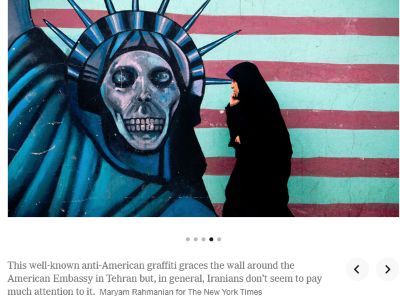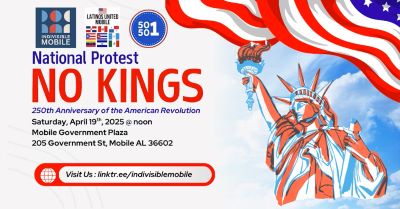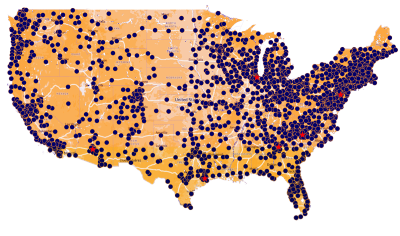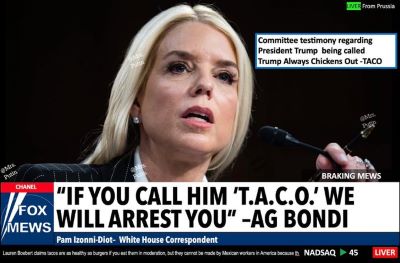
The MAGA mind at work: Before the start of the 2024 Superbowl, broadcaster Mike Crispi claimed that the National Football League is “rigged” in order to spread “Democratic propaganda. He called what would happen”: KC wins, goes to the Superbowl, Swift comes out at the halftime show and ‘endorses’ Joe Biden with [now fiancé] Kelce at midfield. “Taylor Swift, Travis Kelce and a MAGA Meltdown” (January 30, 2024, NYT, print).
WORSE THAN THE BRITISH IN THE WAR OF 1812
According to the President of the United States, the city of Portland will go down in history as one of the worst assaults on an American city. It will rival the British burning of the nation’s capital in the War of 1812, Pearl Harbor, and 9/11. The following snippets express the damage being inflicted on the American city by the dreaded foe Antifa:
“a mess,”
“hell,”
“a hellhole,”
“protect war-ravaged”
“where they kill people and destroy the city,”
“burning to the ground,” with “insurrectionists all over the place,”
“where they kill people and destroy the city.”
“Portland is burning to the ground. It’s insurrectionists all over the place- at White house.”
Therefore the Commander in-Chief has no choice but to deploy the forces at his disposal to defeat this horrific assault by Antifa and to end the carnage.
TRUMP INVASION
In order to defeat the Antifa invasion of Portland which has turned the city into a hell hole, our Commander in-Chief has implemented the following the actions:
1. Closure of the Portland airport – the only reason people would fly into this burning-to-the- ground hell hole where insurrectionists are even more numerous and violent then they were on January 6 is to join the Antifa resistance against America. Why else would anyone fly into Portland.To allow planes to continue to fly in Antifa reinforcements makes no sense what so ever. Therefore by the power invested to the President according to his own mind, he has ordered the Portland airport to be shut down effective immediately.
2. Similarly, roadblocks have been established at all major thoroughfares into the city. Again, the only reason people would drive into the burning to the ground hell hole would be to reinforce the insurrectionists. The closing of these roads will put a crimp into the efforts by the terrorists to reinforce their forces.
3. Effective immediately all Portland Trailblazers basketball games have been cancelled. Large gatherings of innocent people will not be tolerated. They are vulnerable targets not only for ICE but for the insurrectionists as well.
4. Refugee centers will be established outside the zone of terror where people are being killed all over the place. These refugee centers have been established so the good and decent real Americans fleeing the brutal carnage unleashed by Antifa have a place to go where they will be safe and can receive the food, water, shelter, and medical care they need once the government reopens.
It would be folly to allow large gatherings of people in a war zone like for a parade or demonstration.
5. KGW-TV Portland has been forced off the air so as not to provide free media coverage to the terrorists.
‘No Kings’ rallies end peacefully in Portland with resounding message: ‘We cannot be silent’ (October 18, 2025, KGW-TV Portland)
Tens of thousands across Oregon and Washington — and nationwide — peacefully marched in the “No Kings” demonstrations; Portland police
PORTLAND, Ore. — For the second time, tens of thousands hit the streets across Oregon and Washington as part of the nationwide “No Kings” demonstrations.
More than 30 separate rallies and demonstrations were planned throughout the region, with the largest Portland-area gathering at Tom McCall Waterfront Park at the Battleship Memorial.
The Portland Police Bureau had told KGW Friday that they aren’t anticipating major issues and are expecting these protests to be similar to peaceful rallies that the area saw earlier this year.
Even though the airport, the roads, and the basketball games continue as usual, that has not caused the President who is never wrong to change his mind about the situation. So far our President is not capable of learning from the evidence or facts on the ground that he has been as wrong as it is possible to be. His ability to analyze information and make sound reasoned decisions is nonexistent … assuming anyone even tells him the truth in the first place.
“Using the British military to act as a police force was almost always a mistake in the eighteenth century, and the military knew it,” Serena Zabin, “The Revolution at 250: A Conversation,” Journal of the Early Republic (44:4 2024:564).
MEDIA COVERAGE
The media coverage of President Trump’s efforts to quash the insurrection in Portland has missed the critical point of the story. The legal actions, of course, are important. Judges are much more likely to realize that no such insurrection is underway, that life in Portland is proceeding as normal, and that the entire Antifa terrorist activity creating a hell hole of wanton carnage and death is a figment of the mind of the Commander in-Chief.
That is precisely the point. The commander in-chief of the most powerful military force on this planet, is as ignorant about nuclear weapons as he is about Portland.
1. “But with others doing testing, I think it is appropriate that we do so also.” – No one is conducting nuclear testing now, not even his North Korean lover. Testing missiles is not testing weapons. A President of the United States should know this.
2. “the United States has more nuclear weapons than any other country.” Wrong Russia has more. A President of the United States should know this.
3. The Department of War has been ordered to resume testing immediately. Good luck with that. The Energy Department is responsible for testing and underground sites would need to be prepared for resumption of testing after years of non-use. A President of the United States should know this.
The person whose finger is on the bomb is making decisions based on an artificial reality and not the real world.
I am not sure which is worse: to have a Commander in-Chief who is ignorant in Earth 1 about nuclear weapons or one who is making decisions based on the artificial reality of Earth 2. Either way he is not qualified to be Commander in-Chief. His hand is not just playing with marbles but on the nuclear button.
MAGA
Unfortunately the problem is even worse. The MAGA cult believes what its lord and savior the chosen one blessed be his name says about the Antifa insurrection in Portland is true. Consider this well-known story:
One day, two con-men visit the emperor’s capital. Posing as weavers, they offer to supply him with magnificent clothes that are invisible to those who are either incompetent or stupid. The gullible emperor hires them, and they set up looms and pretend to go to work. A succession of officials, starting with the emperor’s wise and competent minister, and then ending with the emperor himself, visit them to check their progress. Each sees that the looms are empty but pretends otherwise to avoid being thought a fool.
Finally, the “weavers” report that the emperor’s suit is finished. They mime dressing him and he sets off in a procession before the whole city. The townsfolk uncomfortably go along with the pretense, not wanting to appear inept or stupid, until a child blurts out that the emperor is wearing nothing at all. The entire town then cries out that the emperor is wearing nothing at all. The emperor is startled, but opts to continue the procession. (Wikipedia)
No MAGA in the Senate is willing to blurt out that the emperor is wearing nothing at all.
No MAGA in the House is willing to blurt out that the emperor is wearing nothing at all.
No MAGA in the White House is willing to blurt out that emperor is wearing nothing at all.
The Vice President is not willing to blurt out that the emperor is wearing nothing at all or to activate the 25th Amendment Section 4: Involuntary presidential disability.
The result is an ignorant President capable of learning that he is wrong and that there is no Antifa insurrection in the real world.
And the Democrats let him get away with it. The Democrats should be conducting daily bus tours of war-ravaged Portland. MAGA influences and podcast hosts should be invited. Democrats should be reminding the voting public that our President lacks the mental necessities to do the job.








 USA Today
USA Today





